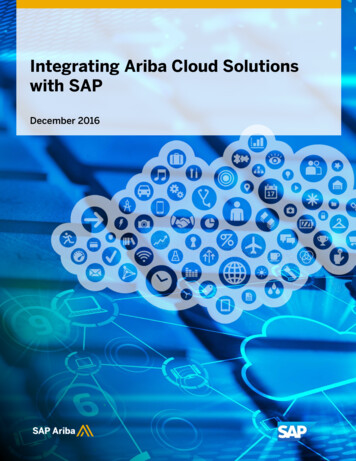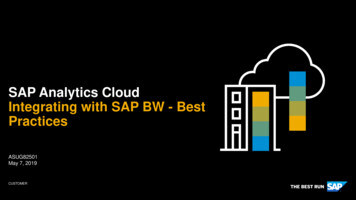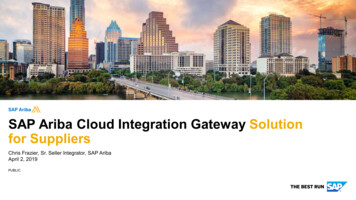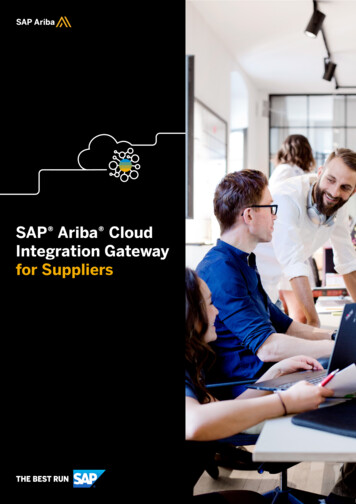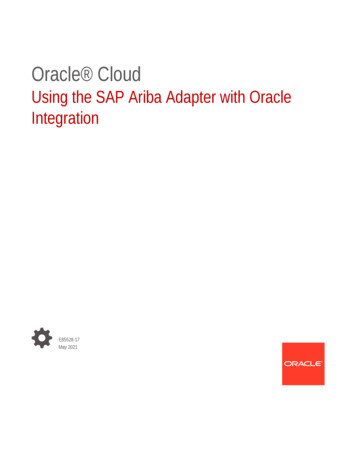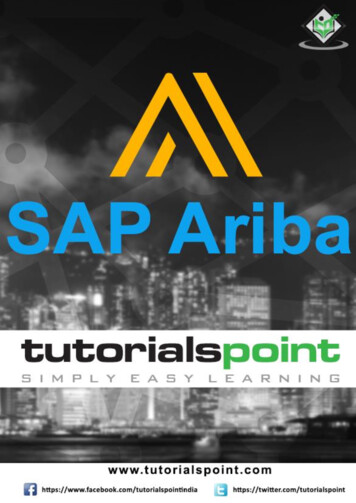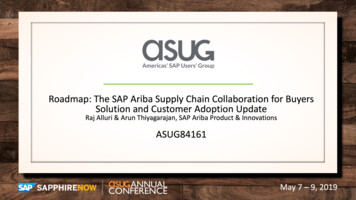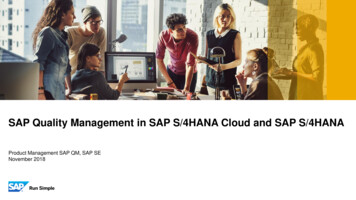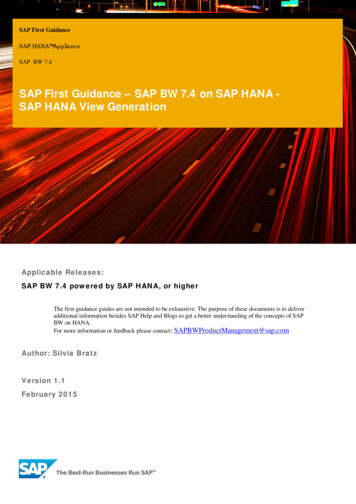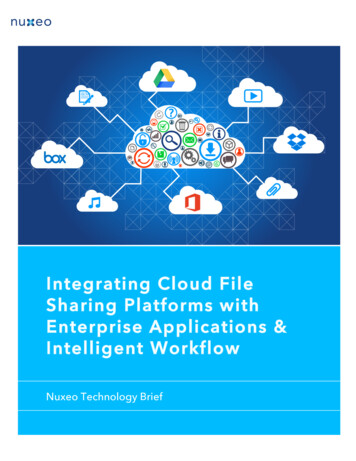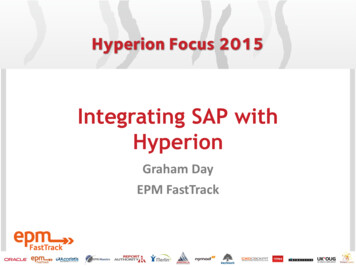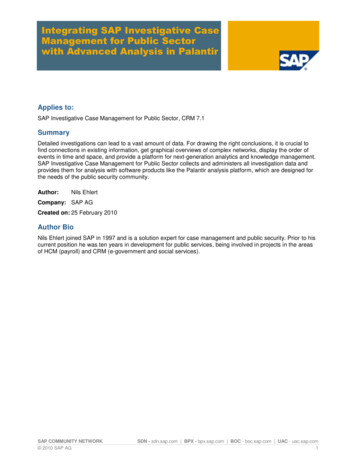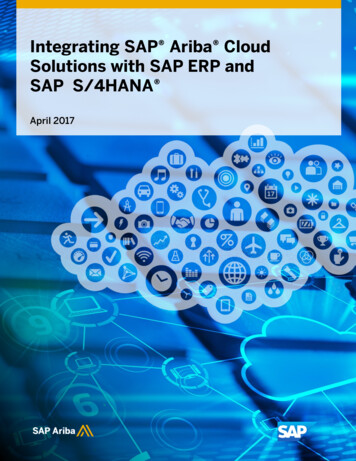
Transcription
Integrating SAP Ariba CloudSolutions with SAP ERP andSAP S/4HANA April 2017-1Integrating SAP Ariba Cloud Solutions with SAP ERP and SAP S/4HANA 2017 SAP SE. All rights reserved.
CONTENTSIntroduction3The Customer Comes First3SAP Ariba Cloud Solutions Integration with SAP ERP and SAP S/4HANA4Ariba Network4SAP Ariba Strategic Sourcing and SAP Ariba Supplier Management Solutions11SAP Ariba Procurement Solutions13SAP Ariba Cloud Integration Gateway15The Future of SAP: SAP S/4HANA and the Integrated Business Network16Upcoming SAP Ariba Cloud Integration EnhancementsAppendix1617-2Integrating SAP Ariba Cloud Solutions with SAP ERP and SAP S/4HANA 2017 SAP SE. All rights reserved.
INTRODUCTIONSAP Ariba is the only cloud provider with true bidirectionalintegration into SAP ERP and SAP S/4HANA , including morethan 150 integration processes and over 5,000 fields integratedto the SAP core.integration solution that can be deployed in exactly the same wayfor all environments. However, that does not mean that therecannot be a consistent and simple approach to integration.SAP Ariba’s approach to integration starts with the followingcustomer-centric integration goals: Protect and leverage customers’ SAP ERP and SAP S/4HANAinvestments Minimize overall integration costs Deliver a best-in-class, seamlessly integrated procurementbusiness process Align with SAP’s strategy, assuring that today’s investmentswill continue to deliver value to customers for years to comeIntegration with SAP Ariba solutions is achieved via the SAPAriba cloud integration framework. The SAP Ariba cloudintegration framework is a suite of components andcomplementary technologies that can be optionally deployeddepending on a customer’s specific landscape. It can be installedas an Add-on to SAP ERP to directly connect to SAP Ariba cloudsolutions Adapter for SAP Process IntegrationTo meet these customer-centric integration goals, we havedesigned a flexible and simple integration framework andintegration solutions based on: Choice – By designing the SAP Ariba cloud integrationframework to provide flexible integration options that fit into acustomer’s landscape Open Standards – By using open standards and commontechnologies for connectivity and data exchange, allowingcustomers to leverage existing IT expertise Simplicity – By eliminating the need for new components,keeping the integration solution simple, and taking advantageof existing infrastructure and components Extensible Business Processes – By providing a rich portfolioof standard integrated business processes that customers canextend and adapt to meet their specific needsThis document provides an executive-level summary of some ofthe most typical integration options between the procurementcapabilities provided by SAP ERP and SAP Ariba on-demandsolutions.The Customer Comes FirstWe understand that customers have already made significantinvestments in IT and infrastructure, and that SAP ERP andSAP S/4HANA landscapes in particular can be very complex forlarge enterprises. Many SAP ERP customers have a long historyof customizations and extensions that fine-tune the solution toperfectly fit their specific need. Hence, no two SAP ERPlandscapes are exactly alike. As a result, there is no singleSAP Ariba Strategic SourcingAriba NetworkSAP Ariba CatalogSAP Ariba Cloud PlatformSupplier CollaborationMaterials ManagementMaterial MasterPlant MaintenanceVendor MasterProject SystemBill of Materials Hierarchies5,000 Integrated FieldsPlanning DemandSRMCost Center AccountingAsset ManagementGeneral LedgerInventory ManagementMaster Data Governance (MDG)FinancialsSAP ERP and SAP S/4HANAProcureContractFund ManagementEnd-to-End Process Enablement-3Integrating SAP Ariba Cloud Solutions with SAP ERP and SAP S/4HANA 2017 SAP SE. All rights reserved.
SAP ARIBA CLOUD SOLUTIONS INTEGRATION WITH SAP ERPand SAP S/4HANASAP Ariba’s products are focused on two key areas: Ariba Network SAP Ariba applications – SAP Ariba Strategic Sourcing, SAPAriba Supplier Management, SAP Ariba Procurement, SAPAriba Supply Chain, and SAP Ariba Financial Supply Chainsolutions Comprehensive – Ariba Network supports all businessprocesses and collaborations that are relevant for theprocurement of goods and services. Intelligent – Ariba Network does not just transmit messages,but also validates their content to eliminate errors that delayprocessing and drive up cost.In this paper we’ll explore the value proposition that each of theseproduct areas brings to you, and how they can be integratedseamlessly to provide added benefits for SAP ERP andSAP S/4HANA customers.SAP ERP and SAP S/4HANA customers integrate their systemwith Ariba Network when they want to manage their procurementprocess within their SAP ERP or SAP S/4HANA environmentwhile also benefiting from the collaboration capabilities andefficiency gains that Ariba Network can provide.Ariba NetworkAriba Network integration with SAP ERP and SAP S/4HANA isnot limited to buying organizations. Suppliers on Ariba Networkcan have their SAP ERP systems integrated with Ariba Networkas well.Ariba Network is a cloud-based network where buyers andsuppliers collaborate by managing different business processes,either via the Ariba Network portal or by exchanging commerceextensible markup language (cXML) messages. Buyingorganizations use Ariba Network to find suppliers and to runautomated business transactions from ordering to issuingpayments. Suppliers use Ariba Network to find new businessopportunities and to work more efficiently and effectively withtheir customers on all the shared aspects of business commerce:proposals, contracts, orders, invoices, and payments.Ariba Network and cXMLSAP Ariba, with the input of many other companies, has definedcXML as an open protocol for business-to-business transactionsin a commerce domain. This is the most comprehensive XMLstandard covering a wide variety of common business processesand the integration protocol that Ariba Network is built upon. ThecXML protocol is continuously updated to support new businessprocesses and new business documents. See https://cXML.orgfor more information.Ariba Network is Open – Ariba Network can integrate various kinds of buyersand suppliers using different technologies and SAP Process IntegrationAriba Network Adapter forSAP NetWeaver BUYSELLAriba NetworkDiscoverConnectCollaboratecXMLCSVEDISAP Ariba CloudIntegration GatewayEDI Integration - X12/EDIFACTDell BoomiConnector-4Integrating SAP Ariba Cloud Solutions with SAP ERP and SAP S/4HANA 2017 SAP SE. All rights reserved.
Ariba Network and SAP ERP and SAP S/4HANAfact, SAP S/4HANA speaks the cXML language by default,which means you don’t need any additional installation tointegrate SAP S/4HANA with Ariba Network for thosescenarios. This will be extended to other business scenarios inthe coming releases.The SAP Ariba cloud integration framework provides thefollowing standard paths to integrate SAP ERP andSAP S/4HANA with Ariba Network: SAP Business Suite add-on for Ariba Network Ariba Network adapter for SAP NetWeaver Ariba Network and SAP ERP or SAP S/4HANAIntegration ScenariosSAP Business Suite Add-On for Ariba NetworkThe SAP Business Suite add-on for Ariba Network is installed inthe SAP ERP system. Its main purpose is to enable SAP ERP tonatively communicate with Ariba Network via cXML without theneed for a protocol mapping between cXML and SAPtechnologies such as BAPI and IDoc.Document AutomationSAP Ariba offers many different integration scenarios tosupport many business processes, but the most typical processis document automation for purchase order (PO) and invoiceautomation. In this scenario, users create POs in their SAP ERPor SAP S/4HANA system, which sends them to the suppliers onAriba Network for processing. Suppliers confirm orders or lettheir customers know if items are backordered; they can notifythem that items have shipped and send a PO invoice forpayment. Business rules enforce process and documentcompliance. For example, you can require that a supplier mustconfirm an order, create a ship notice, or wait for a goodsreceipt notice before they can send an invoice.With the SAP Business Suite add-on for Ariba Network, SAPERP systems can send and receive cXML either directly ormediated via the SAP Process Integration middleware. If SAPProcess Integration is already used for connecting legacysystems, mediated communication via SAP Process Integrationprovides a flexible configuration option to also enable cXMLconnectivity.Ariba Network Adapter for SAP NetWeaverThe Ariba Network adapter for SAP NetWeaver is deployed inthe SAP Process Integration system to translate between cXMLand traditional SAP interfaces such as IDoc, BAPI, and remotefunction call (RFC). It consists of the following components: The design package in the SAP NetWeaver ProcessIntegration component, which contains integrationprocesses, interface objects, and mappings. The cXML adapter installed on the SAP NetWeaver ProcessIntegration component, which conforms to the J2EEconnector architecture (JCA) specification, and implementsthe cXML transport protocol SAP Transport files installed on the SAP ERP systemSAP Ariba Supply Chain CollaborationAriba Network provides enhanced supply chain visibility fordirect materials for discrete and process manufacturing,consumer products and life sciences, and merchandise spendin the retail industry.To improve poor supply chain visibility, communication, andcollaboration among supply chain partners, SAP Ariba SupplyChain Collaboration was developed to provide comprehensivedirect material and supply chain collaboration tools withindustry-specific aspects and a single access point andcollaboration platform for all partners across different supplychains. These scenarios include processes for subcontracting,consignment, forecasting, and supplier-managed inventory aswell as returns.SAP Ariba also provides native integration with SAP S/4HANAfor select business scenarios – PO and invoice automation. InSAP ARIBA COMMERCE AUTOMATION AND SAP ARIBA SUPPLY CHAIN COLLABORATION – BASIC SCENARIOAriba rderConfirmationAdvancedShip NoticeOrderUpdate sUpdateSAP ERP orSAP (MIRO)InvoiceStatusUpdatePaymentStatusUpdateBuyer activitySupplier activityExisting standard integration scenariosGeneral flow is left to right. Arrows illustrate the key integration touch pointsbetween solutions. Integration flows inside a solution are not considered. Verticalgray topics have integration to many areas; arrows are not shown for brevity.-5Integrating SAP Ariba Cloud Solutions with SAP ERP and SAP S/4HANA 2017 SAP SE. All rights reserved.
Contract Manufacturing Collaboration (Subcontract PO)There are several steps in the subcontracting process. The firstis the basic subcontracting purchase orders with components,purchase order confirmation, and ship notice of finished goodsto the buyer. The buyer sends a goods receipt and invoice to thesupplier. Finished production: Integrated suppliers have the option tonotify the buyer of production of the finished goods viamanufacturing execution system (MES) visibility. Thesemessages are usually triggered from completed productionorders in the supplier system and sent to inform the buyer ofhow much finished goods has been produced. Real-time consumption: Real-time consumption is when thesupplier uses up the components originally shipped by thebuyer, and notifies them. Once the buyer receives thenotification, a product activity message is sent to the supplierfrom SAP with current component quantities as SAP needsto be the system of record. If real-time computation is notused, then the product activity message for componentoverview is sent when the goods receipts from the shipnotice of finished goods is sent.In addition, basic subcontracting allows buyers/sellers tomonitor component shipments/deliveries. Componentshipments are supported as well as visibility of componentinventory and component acknowledgement. In the flow below,there are two different options for component shipments. One-step process: In this process both the ship noticerequest and product activity message are sent in a singlestep. The proof of delivery is triggered at the seller side oncethe components have been received. Two-step process: Although the overall steps are the same asthe one-step process, the main difference is when thesesteps are taken. The two-step process waits for the productto be received before the product is moved into the buyersystem, and a product activity message is triggered.The following illustrates typical contract manufacturing processflows along with consumption and execution visibility at thecomponent level:SAP ARIBA SUPPLY CHAIN COLLABORATION – CONTRACT MANUFACTURING PROCESS FLOWSBasic SubcontractingComponent Shipment(Direct Consumption)Component Shipment(Stock in Transit/Consumption)Ariba NetworkSubcontract POPO ConfirmationComponent ShipNotice & InventoryOverview ofComponentsComponentAcknowledgementComponentShip NoticeComponentAcknowledgementInventoryOverview ofComponentsSAP ERP orSAP S/4HANASubcontractPOPO ConfirmationComponent ShipNotice & InventoryOverview ofComponentsProof of DeliveryComponent ShipNoticeProof of DeliveryInventoryOverview ofComponentsMESVisibilityReal-Time ConsumptionBasic SubcontractingAriba nsumptionRecording per POInventoryOverview ofComponentsShip NoticeGoods Receipt &ComponentInventory (No RealTime Consumption)Invoice forSubcontractingSAP ERP orSAP S/4HANAPO Confirmationfor MES VisibilityComponentConsumptionInventoryOverview ofComponentsInboundDeliveryGoods Receipt &ComponentInventory (No RealTime Consumption)InvoiceBuyer ac
Ariba cloud integration framework. The SAP Ariba cloud integration framework is a suite of components and complementary technologies that can be optionally deployed depending on a customer’s specific landscape. It can be installed as an Add-on to SAP ERP to directly connect to SAP Ariba cloud solutions Adapter for SAP Process IntegrationFile Size: 1MBPage Count: 19
